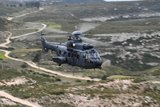ITEC 2012: Saudi Arabia signs with BAE Systems to re-capitalise aircrew training fleet
BAE Systems has been awarded a £1.6 billion contract to support the future aircrew training needs of the Royal Saudi Air Force (RSAF).
The deal, which has been agreed between both the Saudi and UK government under the Saudi British Defence Co-operation Programme, includes the supply of training aircraft, flight simulators and other aids to train aircrew.
The most significant component of the deal is the supply of 55 Pilatus PC-21 advanced trainers for the basic training role and 22 of BAE Systems Hawk jet trainers that will fulfil the fast jet training requirement, while 25 examples of an as
Already have an account? Log in
Want to keep reading this article?
More from Defence Notes
-
![Why small guns have been critical to layered CUAS architectures]()
Why small guns have been critical to layered CUAS architectures
Multiple countries have been deploying small arms as the last line of drone defence due to their multiple operational and tactical advantages.
-
![Singapore Airshow 2026: ST Engineering hints at export success for AME assault rifle family]()
Singapore Airshow 2026: ST Engineering hints at export success for AME assault rifle family
The Singapore-based technology company unveiled its new rifle family at this week’s airshow. Chen Chuanren spoke with the ST Engineering’s head of small arms to find out more about how the weapons have been refined.
-
![High tension in the High North – a wake-up call for NATO’s future Arctic defence efforts?]()
High tension in the High North – a wake-up call for NATO’s future Arctic defence efforts?
Any potential ‘Arctic Sentry’ mission would be months in the planning, but with tensions high in the region given the US’s push for Greenland, NATO countries will need to continue to emphasise their commitment to the region, analysts have said.
-
![Venezuela prepares personnel and equipment for a potential second US attack]()
Venezuela prepares personnel and equipment for a potential second US attack
Defence Minister Gen Vladimir Padrino López has declared that the Venezuelan armed forces “will continue to employ all its available capabilities for military defence”.
-
![As the new year starts, the UK defence spending delay continues]()
As the new year starts, the UK defence spending delay continues
The UK’s defence spending commitments remain uncertain as the government’s Defence Investment Plan, which had been due by the end of 2025, is yet to be published.

























